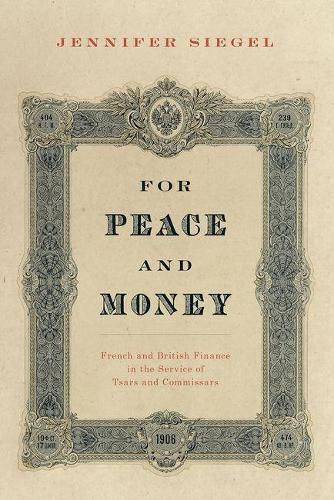Readings Newsletter
Become a Readings Member to make your shopping experience even easier.
Sign in or sign up for free!
You’re not far away from qualifying for FREE standard shipping within Australia
You’ve qualified for FREE standard shipping within Australia
The cart is loading…






From the late imperial period until 1922, the British and French made private and government loans to Russia, making it the foremost international debtor country in pre-World War I Europe. To finance the modernization of industry, the construction of public works projects, the building of railroads, and the development of the military-industrial complex, Russia’s ministers of finance, municipal leaders, and nascent manufacturing class turned, time and time again, to foreign capital. From the forging of the Franco-Russian alliance onwards, Russia’s needs were met, first and foremost, by France and Great Britain, its allies, and diplomatic partners in the developing Triple Entente. Russia’s continued access to those ready lenders ensured that the empire of the Tsars would not be tempted away from its alliance and entente partners.This web of financial and political interdependence affected both foreign policy and domestic society in all three countries. The Russian state was so heavily indebted to its western creditors, rendering those western economies almost prisoners to this debt, that the debtor nation in many ways had the upper hand; the Russian government at times was actually able to dictate policy to its French and British counterparts. Those nations’ investing classes-which, in France in particular, spanned not only the upper classes but the middle, rentier class, as well-had such a vast proportion of their savings wrapped up in Russian bonds that any default would have been catastrophic for their own economies. That default came not long after the Bolshevik Revolution brought to power a government who felt no responsibility, whatsoever, for the debts accrued by the tsars for the purpose of oppressing Russia’s workers and peasants. The ensuing effect on allied morale, the Anglo-French relationship, and, ultimately, on international relations in the twentieth century, was grim and far-reaching.Jennifer Siegel narrates a classic tale of money and power in the modern era-an age of economic interconnectivity and great power interdependency-involving such figures as Lord Revelstoke, chairman of Baring Brothers, the British and French Rothschild cousins, and Sergei Witte, Russia’s authoritative finance minister during much of this age of expansion. For Peace and Money highlights the importance of foreign capital in policymaking on the origins and conduct of World War I.
$9.00 standard shipping within Australia
FREE standard shipping within Australia for orders over $100.00
Express & International shipping calculated at checkout
From the late imperial period until 1922, the British and French made private and government loans to Russia, making it the foremost international debtor country in pre-World War I Europe. To finance the modernization of industry, the construction of public works projects, the building of railroads, and the development of the military-industrial complex, Russia’s ministers of finance, municipal leaders, and nascent manufacturing class turned, time and time again, to foreign capital. From the forging of the Franco-Russian alliance onwards, Russia’s needs were met, first and foremost, by France and Great Britain, its allies, and diplomatic partners in the developing Triple Entente. Russia’s continued access to those ready lenders ensured that the empire of the Tsars would not be tempted away from its alliance and entente partners.This web of financial and political interdependence affected both foreign policy and domestic society in all three countries. The Russian state was so heavily indebted to its western creditors, rendering those western economies almost prisoners to this debt, that the debtor nation in many ways had the upper hand; the Russian government at times was actually able to dictate policy to its French and British counterparts. Those nations’ investing classes-which, in France in particular, spanned not only the upper classes but the middle, rentier class, as well-had such a vast proportion of their savings wrapped up in Russian bonds that any default would have been catastrophic for their own economies. That default came not long after the Bolshevik Revolution brought to power a government who felt no responsibility, whatsoever, for the debts accrued by the tsars for the purpose of oppressing Russia’s workers and peasants. The ensuing effect on allied morale, the Anglo-French relationship, and, ultimately, on international relations in the twentieth century, was grim and far-reaching.Jennifer Siegel narrates a classic tale of money and power in the modern era-an age of economic interconnectivity and great power interdependency-involving such figures as Lord Revelstoke, chairman of Baring Brothers, the British and French Rothschild cousins, and Sergei Witte, Russia’s authoritative finance minister during much of this age of expansion. For Peace and Money highlights the importance of foreign capital in policymaking on the origins and conduct of World War I.